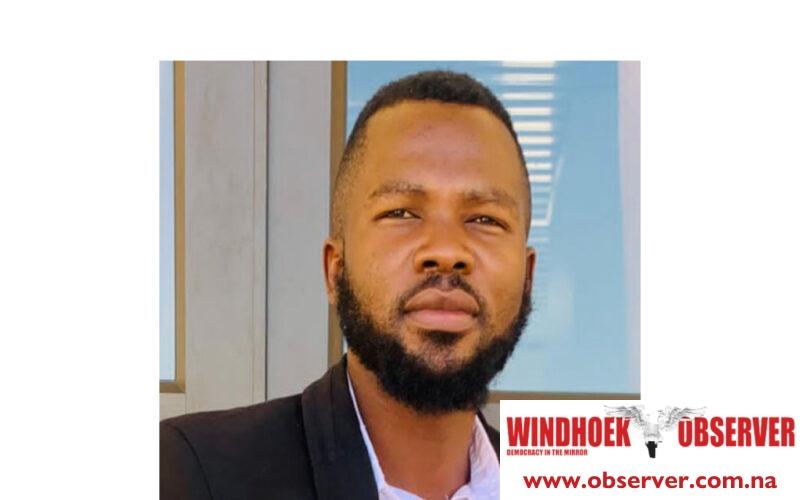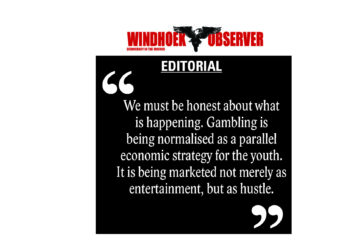Sakaria Johannes
The concept of a “mafia state” has become a critical framework for analysing political systems where state institutions serve private networks of power rather than the public good. These are not failed states in the traditional sense but rather functioning kleptocracies that wear the mask of democratic legitimacy. While Namibia has long enjoyed a reputation as a stable democracy in southern Africa, recent political developments and corruption scandals suggest it may be undergoing a quiet transformation. By examining scholarly definitions of mafia states and linking them to key Namibian cases—including Fishrot, election irregularities, the N$8 million NDF car parts scandal, and the August 26 military company exposé—this essay argues that Namibia exhibits several traits of a mafia state.
Sociologist Bálint Magyar defines a mafia state as a regime where a centralised political elite uses state institutions as instruments for personal enrichment, forming a tightly bound patron-client network. These are not merely corrupt systems—they are systemic criminal enterprises operating within a state structure. Moisés Naím, a political scientist, similarly describes mafia states as those where organised crime has fused with politics, creating a “political-criminal nexus”. In such states, the line between legal governance and illicit enrichment is deliberately blurred. Rachel Kleinfeld adds that in mafia-like systems, elites do not fail to govern—they govern through corruption, impunity, and institutional manipulation, using laws and state violence to protect their networks.
Applying these concepts to Namibia reveals a troubling pattern. The most high-profile case is the Fishrot scandal, uncovered in 2019, which exposed a network of top politicians and businessmen who accepted bribes from Icelandic fishing giant Samherji in exchange for access to Namibian fishing quotas. Former fisheries minister Bernhard Esau and former justice minister Sacky Shanghala were among those implicated. Offshore shell companies and front firms were used to launder millions of dollars in state resources. Not only did this case demonstrate elite corruption, but it also revealed how entire ministries could be co-opted to serve private economic interests. Oversight bodies failed to act until exposed by whistleblowers and foreign media, highlighting the compromised nature of Namibia’s accountability structures.
The situation worsened during the 2024 national elections, where numerous irregularities were reported, including finished ballots and delays in result announcements. Opposition parties and civil society groups questioned the integrity of the process, noting that these anomalies overwhelmingly benefitted the ruling party. Though the elections were not annulled, the credibility of the electoral system was seriously undermined. In mafia states, democratic processes are often reduced to rituals used to legitimise elite rule. Institutions meant to ensure fairness are quietly neutralised from within.
In 2023, the Namibian Defence Force (NDF) was embroiled in another scandal when it was revealed that N$8 million had been spent on vehicle parts through an inflated procurement process. Reports showed that senior officials in the NDF procured car parts at prices many times above market value, with allegations of kickbacks and collusion with private suppliers. This is not an isolated case but part of a broader pattern where state-owned institutions, especially those shielded from public oversight like the military, become channels for elite theft.
Perhaps even more damning is the exposure of August 26 Holdings, a military-owned company operating with complete secrecy and virtually zero oversight. The existence and operations of August 26 were brought into public focus by political activist and former Windhoek mayor Job Amupanda, who used parliamentary tools and public platforms to demand transparency. It was revealed that August 26, which is owned by the Ministry of Defence, handles vast contracts—including construction, fuel, and supplies—without undergoing public tender processes or reporting to Parliament or the Auditor General. When members of parliament demanded access to its financial records, they were told that August 26 is exempt from such scrutiny due to its military links. This lack of transparency allows unchecked abuse of public funds and makes it impossible to determine how much taxpayer money is being diverted for undisclosed purposes. In a true mafia-state fashion, this arrangement places the institution above the law, shielded by state power and secrecy, and likely benefits politically connected individuals.
These examples—Fishrot, election manipulation, the NDF scandal, and the August 26 cover-up—are not random incidents but interlocking pieces in a larger puzzle of elite control and systemic corruption. They reflect how state institutions are captured and used not for national development or public service but for extracting wealth and protecting networks of influence. Even more concerning is the evident selective application of justice. While low-level corruption is often prosecuted, cases involving politically connected figures are delayed, weakened, or quietly buried. The Anti-Corruption Commission (ACC) has repeatedly been criticised for lacking the autonomy and courage to pursue high-level cases, making it more of a symbolic entity than a true watchdog.
To be fair, Namibia still retains features of a functioning democracy. Elections are held, civil society is active, and independent media like The Namibian continue to expose corruption. Yet, as scholars like Naím argue, the presence of a democratic form does not guarantee a democratic function. Mafia states often maintain a façade of legality, using it to deflect criticism while continuing their exploitative practices behind closed doors.
In conclusion, Namibia may not yet be a full-blown mafia state, but the direction of governance increasingly aligns with the mafia-state model. The co-opting of state institutions, political protection of corruption, systemic impunity, and militarised secrecy around entities like August 26 strongly suggest that Namibia is at risk of becoming a hybrid regime—where the formal structures of democracy conceal an informal system of elite criminality. If unchecked, this transformation could have dire consequences for Namibia’s institutions, economy, and future generations. Confronting this reality will require more than exposing scandals; it will demand structural reform, political courage, and a renewed commitment to the rule of law.
Sakaria Johannes is a political science and history graduate from the University of Namibia. He can be reached at sackyuutsi@gmail.com.




